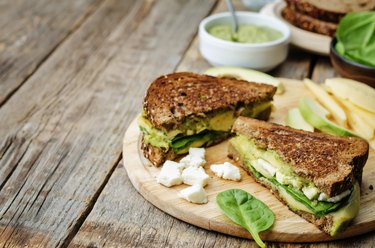
Although skin is a concern in the beauty products industry, healthy skin serves numerous functions that have little to do with physical appearance. Your skin helps to keep germs from entering your body, allows for body temperature regulation and "supports the life of all other body parts," according to the American Skin Association. Altering your diet may help manage skin dryness to guard against cracked fingers and chapped lips. For best results, seek specific guidance from a qualified health-care professional.
Causes
Video of the Day
Environmental factors are the most common cause of skin dryness, which leads to skin cracking, according to Mayoclinic.com. Skin tends to be most dry during the winter, when humidity and temperatures drop. Hot temperatures paired with low humidity in desert regions cause similar effects because lack of humidity means lack of moisture in the air. Air conditioning and sun exposure can also dry your skin, making way for cracking. Diseases, including psoriasis, dermatitis and hypothyroidism can also lead to dry, easily cracked skin. Psoriasis is characterized by raised, dry, scaly skin patches. Eczema has dry, flaky, itchy skin on your face and folded areas, such as your knees and wrists. With hypothyroidism, a lack of thyroid hormones leads to dry skin.
Video of the Day
Dietary Link
Dietary changes cannot cure skin dryness caused by environmental or medical factors. Certain nutrients and eating habits can, however, strengthen your skin's ability to resist and heal, and can increase your skin's elasticity and moisture level. B-vitamins guard against skin disorders, including those associated with skin cracking and sun exposure, according to the ASA. Vitamin C enhances skin smoothness by promoting collagen production. Vitamin A promotes overall skin health. Consuming enough healthy fats known as omega-3 fatty acids, which have anti-inflammatory properties, helps to prevent skin dryness. Deficiencies of nutrients, on the other hand, can make you more susceptible to skin problems.
Helpful Foods
Protein-rich foods, including fish, poultry, beans and peanut butter, provide good amounts of niacin -- a B-vitamin that helps to prevent skin disorders linked with sun exposure. For ample vitamin C, beta carotene and other antioxidants, incorporate colorful fruits and vegetables, such as berries, citrus fruits, mangos, papaya, leafy greens, Brussels sprouts and broccoli in your diet. Top sources of omega-3 fatty acids include cold-water fish such as salmon, mackerel and halibut, and flax seed. To ensure optimum benefits, the University of Maryland Medical Center recommends grinding whole flax seed within 24 hours of use and storing the remaining seed in your refrigerator. Staying well hydrated by drinking water throughout each day also promotes supple, healthy skin.
Foods to Avoid
Although no particular foods cause the skin on your lips and fingers to crack or lose moisture, eating too many low-nutrient foods, such as white bread, candy and potato chips leaves little room in your diet for beneficial fare. Caffeine and alcohol can dry out your skin, according to an "Ebony" magazine article published in October 2000, so limit coffee, energy drinks, soft drinks, wine, beer and cocktails. Foods rich in unhealthy fats, such as red meat, fried foods, high-fat dairy products and fast food, can increase inflammation in your skin.